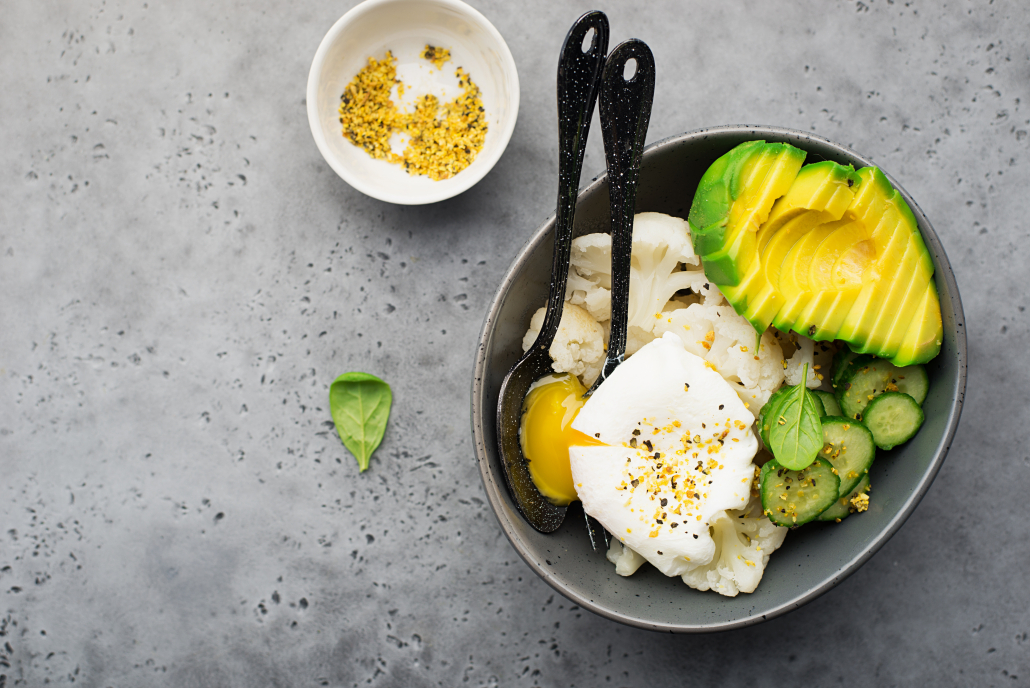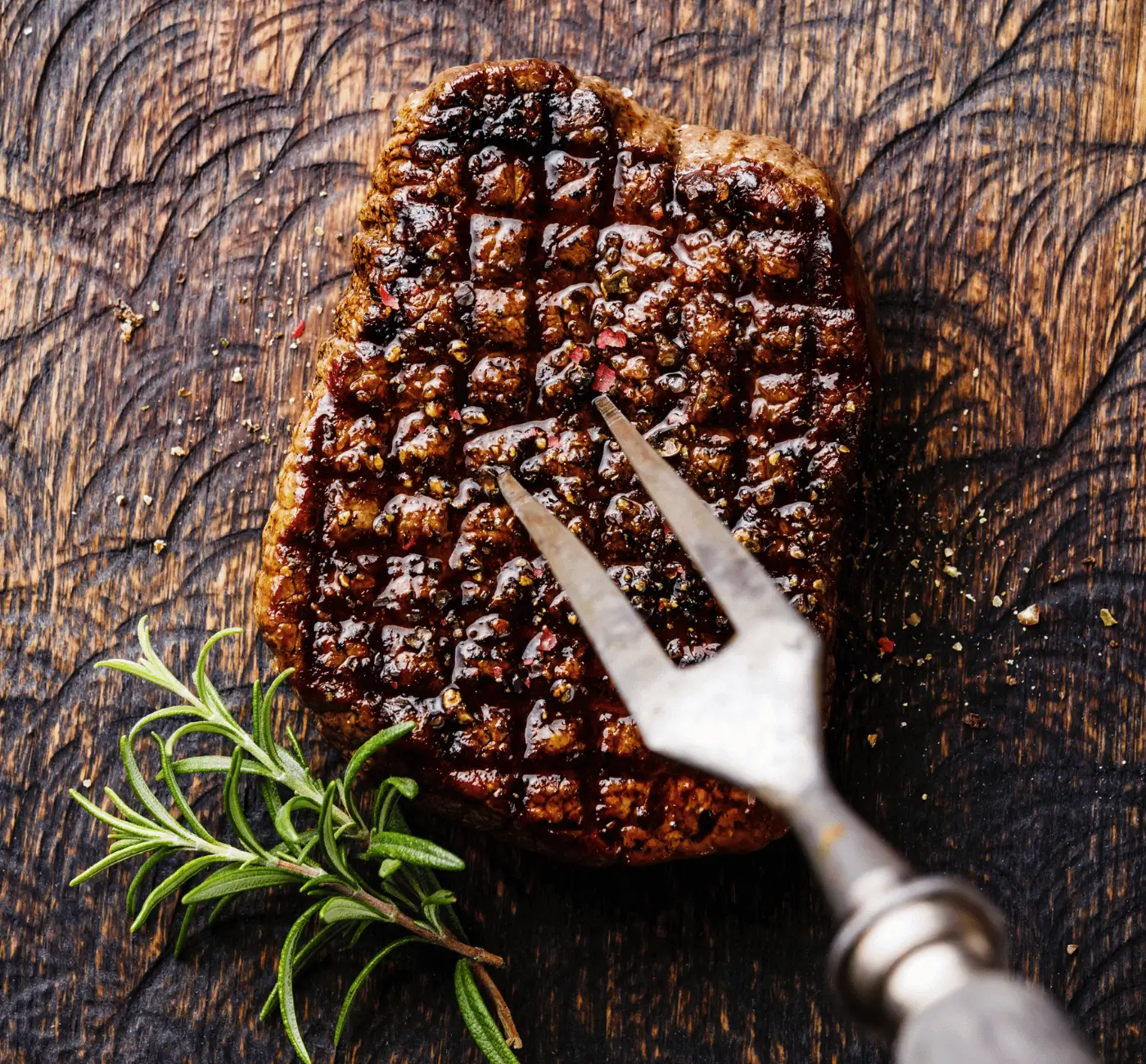
If you’re a vegetarian interested in diet and health, you’ve probably heard the buzz around ketogenic diets and wondered if keto is compatible with a vegetarian lifestyle?
The answer is Yes! In this article we’ll show you how.
A ketogenic (keto) diet means eating high-fat, moderate-proteins, and low to no carbohydrates. This macronutrient ratio switches the body from using carbohydrates for fuel, to turning fat into energy molecules called ketones. When ketone levels become elevated, you are in the metabolic state called ketosis, hence the name “keto diet”. [1]
The macronutrient profile of a ketogenic diet looks like this:
For vegetarians, keto can feel intimidating and inaccessible because many people who chose to be vegetarians often do so for two mains reasons:
People that chose keto do so for reasons that commonly include:

On the surface, “ketotarians” and vegetarians might look like two entrenched armies. But where they often meet is in a shared desire to cut out toxic processed foods that saturate the Standard American Diet (SAD), and take control of their health through intentional eating.
If you’re a vegetarian and you can get on board with the benefits of fat, going keto while remaining vegetarian is possible, healthy, and sustainable.
Essential dietary fats are found throughout both the animal and plant kingdoms. Eating a high-fat low-carb diet makes fat your main energy source, which provides many benefits including:

The vegetarian keto diet is an eating plan that combines aspects of vegetarianism with the keto emphasis on high-fat, moderate-protein, and low-carbs. Keto vegetarians follow roughly the same macro and micronutrient proportions as you would on a standard keto diet.
To create the vegetarian keto diet that’s best for you, it’s important to determine what kind of vegetarian you are and build your plan accordingly.
The more liberal the type of vegetarian you are, the easier and healthier it will be to adopt a high-fat low-carb lifestyle.
This is because we humans need to eat a diet that provides essential fats, and all 9 essential amino acids, AKA complete proteins. When a nutrient is “essential,” this means that our bodies cannot produce it on our own, so we have to get it from the foods we eat.
While animal foods provide all the essential fats and amino acids in near perfect-proportions for humans, most plants lack one or more of them. [8]
If you’re on a vegetarian diet that excludes all animal products, you have to get your essential fats and proteins from grains, legumes, and seeds/nuts. The high carbohydrate content of these foods makes them difficult to fit into a keto diet that restricts carbs to less than 35 grams per day.
Not all vegetarians follow the same diet. Ordered by most strict, to the most liberal, here are 4 main types of vegetarians:
Vegans
Lacto vegetarians
Lacto-Ovo vegetarians
Pescatarians
To give yourself the best chance of implementing, maintaining, and thriving on a vegetarian keto diet, it’s important to follow these five steps.
Use this keto calculator to determine the amount of fats and proteins you need to optimally sustain your body and activity level. Once you know your macronutrient needs you’re ready to reduce and add foods accordingly.
To get into ketosis start by limiting your carb intake to a maximum of 20 grams per day. This means cutting out nearly all of the most popular vegetarian protein and carbohydrate sources including:
Fats are the cornerstone of every keto diet, accounting for between 70% and 80% of your calories. So the type of fats you chose is critical to the success of your vegetarian keto plan, and your overall health.
The best fats for a vegetarian keto diet include:
Salmon, tuna, anchovies, herring, mackerel, and sardines are rich in high-quality protein and essential omega-3 fats. Salmon, herring, and sardines also provide substantial amounts of vitamin D, a nutrient that can be hard to get naturally for most vegetarians. Vitamin D is critical for immune function, bone health, among other important functions. [9]
Eggs are one of the most nutrient dense foods on earth. A single 56-gram egg is loaded with 5 grams of fat, 7 grams of protein, and 80 calories [10] When eating eggs, especially on a vegetarian diet, its crucial to eat the whole egg. The yolk is rich in B vitamins and crucial antioxidants including lutein and zeaxanthin which are important for eye health. [11]
Getting enough fat can be a challenge on any keto diet, and even harder for vegetarians. Butter is the perfect carb-free fat-boosting vegetarian keto staple.
Though victim to decades of misinformation and bogus links to poor heart health, high-quality current research shows only a small to neutral association between butter and heart disease.21 When part of a keto diet where your body burns fat for fuel, butter is likely very healthy.
Butter is also a rich source of the fatty acid butyrate, which research suggests may play a significant role in promoting brain health. [12]
But not all butter is created equal. Research indicates that organic butter from grass-fed cows may have healthier fats than conventional butter. [13]
For vegetarians who can tolerate dairy, cheese can make another great high-fat, low-carb staple. One of the best things about cheese is that there are so many varieties to choose from. This can help keep a keto vegetarian diet more interesting after cutting out many of the familiar staples. Many kinds of cheese offer optimal ratios of fat and protein. And varieties of fermented cheeses like creme fraiche, cheddar, and gouda can provide probiotics. [14]
Avocados are loaded with healthy fats while offering a decent rundown of essential vitamins and minerals. One avocado can provide 30% of your daily potassium intake, which can be hard to get on a keto diet. Avocados have also been shown to balance blood sugar, support heart health along with healthy aging. [15] [16]
Popular in both vegetarian and non-vegetarian keto diets, coconut oil is a natural source of medium-chain triglycerides (MCTs). This type of fat is easily absorbed and turned into energy. That’s why people often use MCT’s to help with the transition into ketosis. [17]
One of the most researched sources of healthy fats, olives and olive oil contain hard-to-get vitamin E, along with compounds that reduce inflammation and associated diseases including heart disease, osteoporosis and cancer. [18] [19]
A note when cooking with oils: Many vegetable oils including olive oil contain polyunsaturated fatty acids (PUFAS). For example, olive oil is 73% monounsaturated, 11% polyunsaturated and 14% saturated [20] .These fats can be destabilized and “oxidized” when exposed to high heat.
Though fairly heat stable when compared to other vegetable oils, its still best to avoid heating olive oil. When overheated, PUFAS form toxic compounds, including lipid peroxides and aldehydes that can contribute to cancer. [21] [22]
Though it’s true that animal foods contain all of the nine essential amino acids, non-meat animal sources including eggs and dairy can round out the protein needs for most vegetarians.
Because bodies and activity levels vary from person to person, we recommend aiming for 1.2 to 2.0 grams of protein per KG of body weight. This averages out to around 70 grams of protein per day accounting for roughly 25% of your total calorie intake.
We believe that one of the key factors that make keto diets so healthy is that they tend to cut out most plant-foods. The idea that plants aren’t ideal foods might seem surprising at first, but consider things from the plant’s perspective; like humans and other living creatures, plants are here to survive and reproduce.
To achieve these goals plants are loaded with plant toxins and antinutrients. They protect plants from pests (including us humans) and environmental threats like fungus and mold. These toxins include naturally-occurring pesticides, mineral chelators, and antibiotics. They can also prevent you from absorbing nutrients properly, leading to a net nutrient loss when absorption rates are considered.
For vegetarians who want to avoid toxins in their foods by eating plants, this can come as a rude surprise. Researchers estimate that the average American eats about 1.5g of naturally occurring plant toxins per day. [23] Many of these toxins are potent natural pesticides. We all know that synthetic pesticides sprayed on plants are a big deal, but the level of natural pesticides we consume is 10,000 times greater. [24]
Many plant foods are also high in specific toxins called oxalates. They’re one of the mains reasons why your body does not absorb nearly all the iron and K1 that leafy greens like spinach are praised for. Grains and legumes are also high in antinutrients, including phytic acid, which can reduce the absorption of crucial minerals including iron to calcium. [25]
Additionally, plant foods contain phytoestrogens which can increase infertility and developmental disorders. [26] That’s why we don’t include soy in a recommended protein for vegetarians.
With that said, we know how tough it can be to cut plant foods for anybody, and especially vegetarians. So here’s a list of low-carb plants that we recommend consuming sparingly along with correct proportions of healthy fats and proteins.
Note that most vegetables also contain some protein that needs to be factored into your ratios.
Seed and vegetable oils are modern processed foods. Even olive oil only came onto the scene 4,000 years ago. A mere blip on the timeline of our dietary evolution.
There are two kinds of vegetable oils that should be avoided or reduced. The most inflammatory fat is Trans Fatty Acids should be completely removed. Numerous studies link them to inflammation and heart disease. [27] Almost all highly processed foods contain trans fats in the form of:
The second kind of fats to avoid or reduce are called polyunsaturated fatty acids (PUFAs). [28] They are easily oxidated and can increase inflammation and cardiovascular disease. [29] PUFAs are everywhere–here’s a few of the most common sources to watch out for.
Though the data on the overall benefits and drawback of vegetable oils for healthy people is inconclusive, [30] [31] if one of your goals is to eat less processed foods and stay metabolically closer to human evolutionary eating patterns, we strongly recommend getting your fat from whole foods, including oily fish, eggs, butter, cheese, with olive oil as an exception.
On a vegetarian keto diet that restricts legumes and grains (fortified), and without animal meats, it’s important to make sure you’re getting adequate amounts of omega-3 fats, vitamin D, iron, vitamin B12, calcium, zinc, magnesium, and potassium.
Though this keto for vegetarians guide is intended to help you meet all of your macro and micronutrient needs, in some cases supplementation may be necessary. Vitamin D is hard to get enough of on any diet, so we recommend supplementation.
As with any dietary changes, it’s crucial to pay attention to how you feel and adjust accordingly.
Though going keto for vegetarians might at first feel like a non-starter, it’s not only possible, but healthy, and sustainable.
Making fat the primary source of fuel for your body has tremendous benefits, and the good news is that there are plenty of non-meat sources of healthy fats and proteins to meet your essential nutrient needs.


We’re a global community of seekers, healers, and doers committed to reclaiming health on our own terms. When you join the Kiltz Mighty Tribe (KMT), you’ll gain access to education, support, and collective wisdom.


